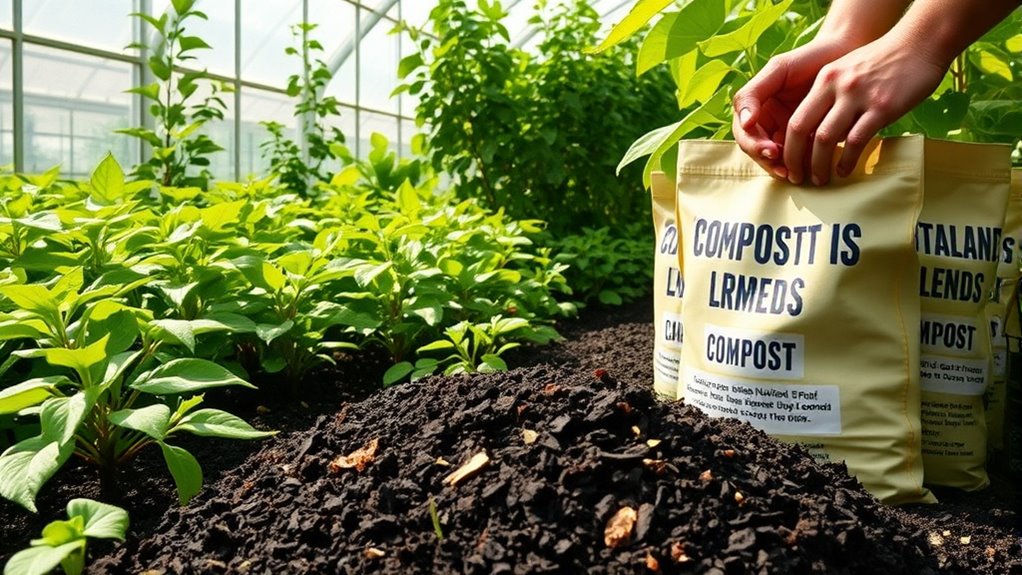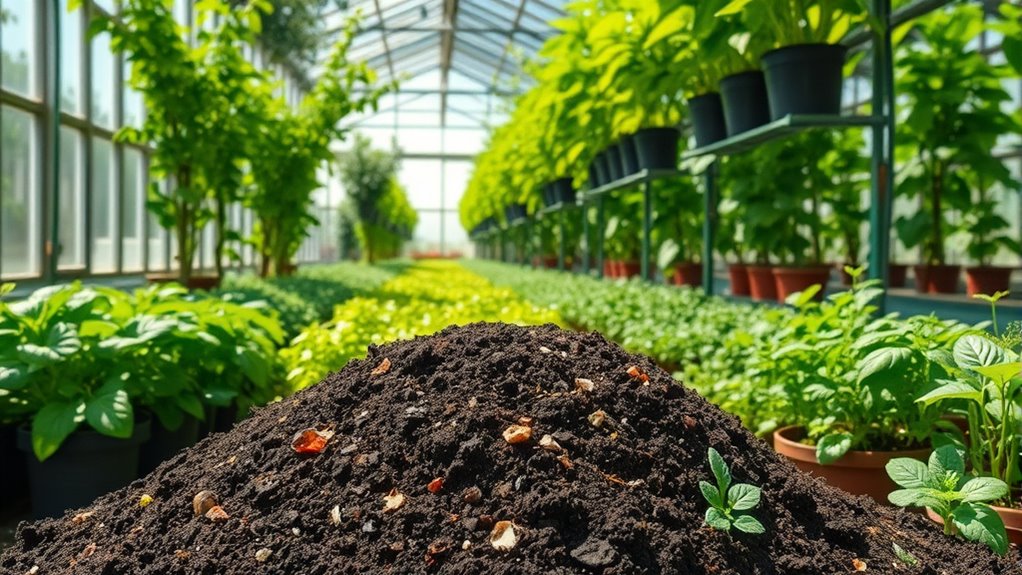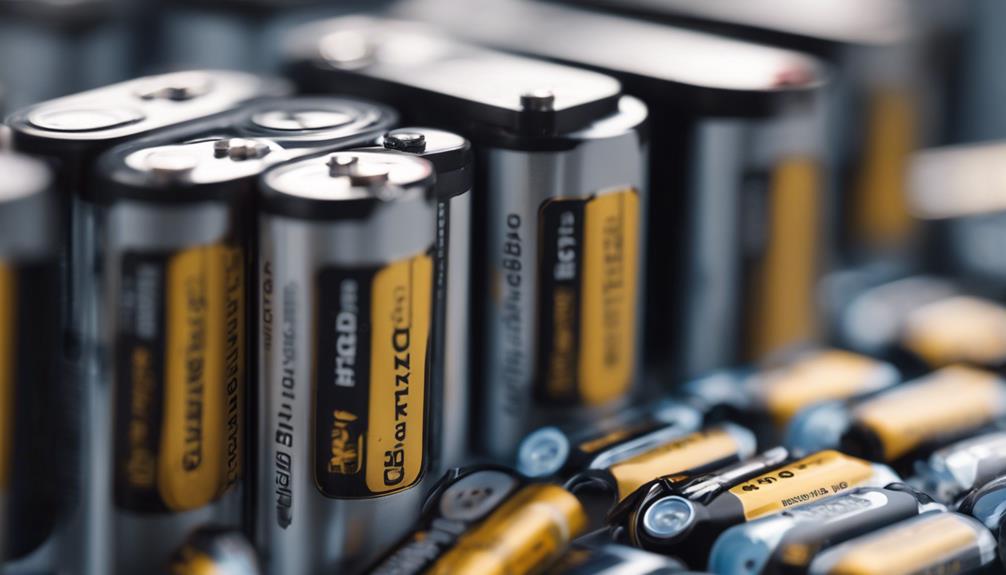If you're looking to enhance your greenhouse plants in 2025, I recommend exploring options like Raised Bed Mix Organic Potting Soil, Fort Vee Organic Potting Soil Mix, and Garden Magic Compost and Manure. These composts provide essential nutrients, improve soil structure, and promote healthy growth. You might also contemplate compost accelerators like Roebic CA-1 and GREEN PIG for faster results. There's a lot more to reflect on when selecting the right compost for your greenhouse setup.
Key Takeaways
- Select organic potting soils like Fort Vee and Raised Bed Mix for their high nutrient content and excellent support for heavy feeders in greenhouses.
- Consider compost products such as Garden Magic and Ribbon Organics for their rich nutrient blends that improve soil structure and water retention.
- Utilize compost accelerators like Roebic CA-1 to enhance decomposition, ensuring nutrient-rich compost for optimal plant growth.
- Choose compost that maintains stable pH levels between 6.0 to 7.0 to prevent nutrient deficiencies and toxicities in greenhouse plants.
- Look for certified organic options to ensure quality, safety, and consistency in nutrient content for eco-friendly greenhouse gardening.
Raised Bed Mix Organic Potting Soil for Plants & Vegetables
If you're looking to create a thriving greenhouse garden, the Raised Bed Mix Organic Potting Soil from Vermont Compost Company is a fantastic choice for both plants and vegetables. This high-nutrient, compost-based soil is perfect for my raised beds. I've found it easy to use and effective for both indoor and outdoor plants. With an impressive average rating of 4.5 stars from users, it's clear that many gardeners appreciate its quality. Just keep an eye on your plants' growth to gauge how well they're thriving. Overall, it's affordable and a solid investment for any organic gardening enthusiast.
Best For: Organic gardening enthusiasts looking to cultivate healthy plants and vegetables in raised beds.
Pros:
- High-nutrient compost-based formula promotes healthy plant growth.
- Easy to use for both indoor and outdoor gardening projects.
- Affordable option with a strong average customer rating of 4.5 stars.
Cons:
- Some users report concerns about the size of the bag not being sufficient.
- Occasional mentions of foreign materials found in the soil.
Fort Vee Organic Potting Soil Mix (20 Quarts)
Fort Vee Organic Potting Soil Mix is an ideal choice for gardeners looking to support robust plant growth, especially for heavy feeders like tomatoes and peppers. This high-nutrient, compost-based mix combines composted manure, peat moss, and various meals to deliver sustained nutrition. Its exceptional texture promotes healthy root development and drainage, making it perfect for indoor or outdoor use. With a solid 4.5-star rating from 285 reviews, many users rave about the rich nutrients that lead to thriving seedlings. While some mention occasional large pieces in the mix, I find it's worth the investment for quality results.
Best For: Gardeners looking to enhance plant growth, particularly for heavy feeders like tomatoes, peppers, and cucumbers.
Pros:
- High-nutrient compost-based mix supports healthy root development and sustained nutrition.
- Exceptional texture promotes aeration and drainage, ideal for robust transplants.
- Positive customer feedback highlights rich nutrients leading to thriving seedlings.
Cons:
- Some users report the presence of large pieces, such as bark or twigs, affecting germination rates.
- Higher price point may be seen as a drawback for some gardeners.
- Occasional confusion regarding mix contents, such as vermiculite mistaken for metal.
Garden Magic Compost and Manure (40 Pound)
Garden Magic Compost and Manure (40 Pound) stands out as an excellent choice for gardeners seeking a reliable nutrient source for their plants. This blend of organic reed sedge peat and compost animal manure provides essential nutrients for flowers, vegetables, and grass. I love its odorless and naturally moist consistency, making it easy to apply. Just scatter it across your garden or lawn, and you'll enhance soil quality and drainage. With a customer rating of 4.5 stars, I've found it particularly effective for vegetable gardens like corn and artichokes. It's a great investment for anyone looking to boost their plant growth!
Best For: Gardeners looking for a nutrient-rich compost to enhance soil quality for flowers, vegetables, and lawns.
Pros:
- Provides essential nutrients for a variety of plants, promoting healthy growth.
- Odorless and naturally moist, making it user-friendly and easy to apply.
- Versatile for use in potting soil, raised beds, and general garden enhancement.
Cons:
- Some users may find it more expensive compared to bulk compost options.
- Limited to a specific weight and volume, which may not be sufficient for larger gardening projects.
- Effectiveness may vary based on existing soil conditions and specific plant needs.
Roebic CA-1 Bacterial Compost Accelerator (2.5 pounds)
Looking to speed up your composting process? I've found the Roebic CA-1 Bacterial Compost Accelerator to be a game-changer. This 2.5-pound formula enhances decomposition, creating nutrient-rich compost while keeping pH levels suitable for beneficial bacteria. It works effectively across various temperatures, so you can compost year-round. Just sprinkle it over your pile, and you'll see visible results in about four months. Users rave about its ease of use and the absence of odors when applied correctly. Plus, it's safe for beneficial insects like worms, making it ideal for any gardening setup. Give it a try—you won't regret it!
Best For: Gardeners and compost enthusiasts looking to accelerate their composting process and create nutrient-rich compost efficiently.
Pros:
- Boosts decomposition and biological activity, resulting in faster composting.
- Safe for beneficial insects like worms, making it ideal for diverse gardening setups.
- User-friendly application; simply sprinkle over the compost pile.
Cons:
- Some users reported limited effectiveness in specific cases.
- Results may take up to four months to be visible.
- Requires proper application to avoid potential odors if composting is not managed correctly.
Ribbon Organics OMRI Certified Organic Compost (7.9 Gallons)
For anyone serious about cultivating a thriving greenhouse, Ribbon Organics OMRI Certified Organic Compost is a standout choice. This 7.9-gallon bag packs a punch with its nutrient-rich blend of food and yard residuals. It's high in essential nutrients like nitrogen and potassium, which really boosts plant growth. I love how it enhances soil structure and water retention, making my plants thrive. Plus, it's certified organic, ensuring my garden stays free of contaminants. With a solid 4.6-star rating from over 600 users, I can confidently say this compost is worth every penny for vibrant and healthy plants.
Best For: Gardeners looking for a high-quality organic compost to enhance soil health and promote vibrant plant growth.
Pros:
- Nutrient-rich composition: Contains high levels of nitrogen, phosphorus, and potassium, essential for plant growth.
- Certified organic: Ensures safety from contaminants, making it suitable for vegetable and flower gardening.
- Improves soil quality: Enhances soil structure, aeration, and water retention, benefiting overall plant health.
Cons:
- Pricey: Some users may find it expensive compared to other compost options.
- Weight variation: Moisture content may affect the weight, leading to inconsistencies in quantity.
- Limited availability: May not be easily accessible in all regions, depending on local suppliers.
Espoma MC75 0.75 Cubic Ft Mushroom Compost
Espoma MC75 Mushroom Compost stands out as an excellent choice for greenhouse enthusiasts seeking to enhance their plant growth and soil quality. This 0.75 cubic foot blend of mushroom compost and aged forest products provides organic coverage, making it perfect for soil conditioning. I've noticed significant improvements in my plants, from herbs to tomatoes. While some users mention bits of sticks and bark, I find the quality justifies the price. With a solid rating of 4.5 stars, it's clear many gardeners share my satisfaction. If you're ready to boost your greenhouse, give Espoma MC75 a try!
Best For: Greenhouse enthusiasts and gardeners looking to enhance plant growth and improve soil quality.
Pros:
- High-quality blend of mushroom compost and aged forest products promotes organic growth.
- Positive customer feedback highlights significant improvements in various plants, including herbs and tomatoes.
- Solid rating of 4.5 stars indicates general satisfaction among users.
Cons:
- Some users report the presence of sticks and bark mulch in the compost blend.
- Pricing concerns may arise, although many feel the quality justifies the cost.
- Limited size of 0.75 cubic feet may not be sufficient for larger gardening projects.
R&M Organics Premium Organic Compost
R&M Organics Premium Organic Compost stands out as an exceptional choice for greenhouse enthusiasts who want to nourish a variety of plants, from vibrant flowers to fruitful vegetables. Made from 100% dairy cow manure, it's a high-nutrient, all-purpose fertilizer that improves soil quality. Just a quarter inch applied to existing gardens works wonders; for new plants, mix it with soil. I love its fine texture, making it easy to spread without any unpleasant odor. Plus, it enhances moisture retention, saving me time on watering. While some might find it pricey, the results I've seen are truly rewarding.
Best For: Greenhouse enthusiasts and gardeners looking for a high-nutrient, all-purpose fertilizer to enhance plant growth and soil quality.
Pros:
- High nutrient value improves soil quality and supports plant growth.
- Low odor makes it suitable for both indoor and outdoor use.
- Fine-grained texture allows for easy spreading and mixing into soil.
Cons:
- Some users may find the price relative to quantity to be high.
- Mixed reviews on overall plant satisfaction after use.
- Requires a specific application amount which might be a learning curve for new users.
Fort Vee Organic Potting Soil Mix (20 Quarts)
If you're looking for a high-nutrient solution for your greenhouse, the Fort Vee Organic Potting Soil Mix is an excellent choice, especially for heavy feeders like tomatoes and peppers. This 20-quart mix combines composted manure, sphagnum peat moss, and vermiculite, promoting healthy root development and nutrient retention. I love how it holds its shape after watering, providing a great texture for robust transplants. Although some users mentioned larger pieces affecting germination, the rich nutrients lead to impressive growth. While the price might be a bit high, I believe the quality results make it a worthwhile investment for my plants.
Best For: This product is best for indoor and outdoor gardeners looking to support heavy feeders like tomatoes, peppers, and cucumbers with a high-nutrient potting soil mix.
Pros:
- Rich in nutrients, promoting healthy seedlings and robust growth.
- Holds shape after watering, providing excellent texture for transplants.
- Supports healthy root development and nutrient retention with quality ingredients.
Cons:
- Some users reported larger pieces in the mix, which can affect germination rates.
- Higher price point compared to other potting soils on the market.
- Limited availability may lead to longer wait times for delivery.
Amendment Nutrient Carbon Sequestration Fertilizer (4lb)
For gardeners seeking a reliable and effective way to boost their flower and vegetable beds, the Amendment Nutrient Carbon Sequestration Fertilizer (4lb) stands out as an excellent choice. This composted cow manure fertilizer not only provides essential NPK nutrients but also features a slow-release formula that protects tender roots from burning. I love how it improves soil structure, enhancing water and nutrient availability, while increasing moisture retention in sandy soils. Plus, its environmentally friendly composition supports carbon sequestration, contributing crucial organic matter to my garden. It's ideal for ensuring my plants thrive beautifully and healthily.
Best For: Gardeners looking for an effective composted fertilizer to enhance their flower and vegetable beds while promoting soil health.
Pros:
- Provides essential NPK nutrients in a slow-release formula, preventing root burn.
- Improves soil structure and moisture retention, benefiting plant growth.
- Environmentally friendly, supporting carbon sequestration and enhancing soil organic matter.
Cons:
- Directions for application are not specified, which may confuse some users.
- Limited to garden use, may not be suitable for all types of plants or soils.
- The 4lb size may not be sufficient for larger garden areas.
F2C Garden Compost Bin (80 Gallon)
The F2C Garden Compost Bin (80 Gallon) stands out as an ideal choice for gardeners and homesteaders who want a practical and efficient composting solution. Made from thick, BPA-free plastic, it keeps heat and moisture for faster composting. I love the top-loading design, which keeps pests away, and the bottom door makes accessing compost easy. With a capacity of 80 gallons, I can compost organic waste in just 4-6 weeks. Assembly takes only minutes, and the air vents boost aeration. While some users mention durability issues, it's still a fantastic option for those seeking manageable composting without heavy-duty demands.
Best For: Gardeners and homesteaders seeking an efficient and user-friendly composting solution.
Pros:
- Easy to assemble in just 5-10 minutes without any tools required.
- Large 80-gallon capacity allows for composting organic waste in 4-6 weeks.
- Top-loading design and bottom door make filling and accessing compost convenient while deterring pests.
Cons:
- Some users report durability issues and the need for additional weights to secure the lid.
- The lid may not seal tightly, leading to potential pest access.
- The bottom door can pop open if not handled carefully.
Espoma Organic Compost Starter (4 lb. Bag)
Espoma Organic Compost Starter (4 lb. Bag) is my go-to for enhancing my compost pile. This all-natural composing aid, from the trusted Espoma Company, speeds up decomposition of organic matter remarkably. I simply add one cup per 16 cubic feet to my compost tumbler anytime I introduce new materials. I love that it's made from premium organic ingredients, free from synthetic chemicals, making it a safe choice for my plants. Users rave about the quick heating effect, and while the smell is strong, it's typical for compost starters. Overall, I find it a reliable addition to my composting routine.
Best For: Gardeners and compost enthusiasts looking to enhance the decomposition process of organic materials in their compost piles.
Pros:
- Accelerates decomposition: Users report improved compost quality and faster heating of the compost pile after application.
- Organic certification: Made from all-natural ingredients, free from synthetic chemicals, ensuring safety for plants.
- Versatile usage: Can be added any time organic materials are introduced, making it easy to incorporate into any composting routine.
Cons:
- Strong odor: The product has a potent smell typical of compost starters, which may require storage in a less accessible area.
- Mixed effectiveness: Some users experienced slower results or found it less impactful for their specific composting needs.
- Packaging issues: A few customers reported receiving incorrect items, which could lead to frustration despite satisfaction with the product overall.
Compost Starter/Accelerator for Kitchen and Yard Waste (4 Packets)
If you're looking to transform your kitchen and yard waste into nutrient-rich compost, Convino's compost starter/accelerator is a fantastic choice. Each box comes with four packets, capable of treating up to 100 pounds of waste. I've found it incredibly effective at eliminating odors, thanks to its billions of beneficial microorganisms and essential oils. The pleasant citrus and herb aroma makes composting a more enjoyable experience. Plus, it accelerates the decomposition process, turning vegetable scraps into compost in just a few days. Overall, Convino has greatly improved my compost quality and waste management routine. You won't regret giving it a try!
Best For: Those looking to efficiently compost kitchen and yard waste while reducing unpleasant odors.
Pros:
- Effectively eliminates odors using beneficial microorganisms and essential oils.
- Accelerates the composting process, turning waste into compost in just a few days.
- Suitable for various composting systems, making it versatile for different users.
Cons:
- Some users report issues with fruit fly presence despite following instructions.
- Mixed results for a few users regarding the product's long-lasting effects.
- Requires mixing with water for application, which may be an extra step for some users.
2 Pack Underground Compost Bin for Garden
Looking for an efficient solution to manage your organic waste? I recently discovered the 2 Pack Underground Compost Bin, perfect for gardens and greenhouses. Made from durable, environmentally safe plastic, it's designed to transform food scraps and yard waste into nutrient-rich compost effortlessly. The underground setup requires minimal maintenance, thanks to its integrated hole system that guarantees proper airflow and drainage. I've found it easy to use, speeding up decomposition and producing fertile soil. With a competitive price and positive reviews, this compost bin is a fantastic addition to any garden. Give it a try—you won't regret it!
Best For: Gardeners, backyard enthusiasts, and educators looking for an easy, low-maintenance composting solution.
Pros:
- Durable and environmentally safe plastic ensures longevity and sustainability.
- Effortless underground setup requires minimal maintenance without the need for turning or mixing.
- Positive user feedback highlights ease of use and effectiveness in producing nutrient-rich compost.
Cons:
- Limited capacity may not be suitable for larger households or extensive gardens.
- Requires installation underground, which may not be feasible for all users or spaces.
- Mixed reviews on effectiveness, with an average rating of 3.7 out of 5 stars.
F2C Compost Tumbler Bin 43 Gallon Dual Chamber Compost Bin
For gardeners enthusiastic to optimize their greenhouse's productivity, the F2C Compost Tumbler Bin stands out with its 43-gallon capacity and efficient dual chamber design. This sturdy bin, made from BPA-free PP and powder-coated steel, can withstand winds up to 40 mph when filled. Its dual chambers let me compost simultaneously, mixing greens and browns for better results. The aeration system guarantees proper oxygen circulation, speeding up the process to just weeks. Assembly is straightforward, taking about 30-60 minutes. I've found the nutrient-rich compost it produces truly enhances my plants' growth, making it a fantastic investment for any gardener.
Best For: Gardeners looking to efficiently compost organic waste while maximizing space and time with a dual chamber system.
Pros:
- Durable construction allows the bin to withstand high winds when filled.
- Dual chamber functionality enables simultaneous composting, speeding up the process.
- Aeration system enhances oxygen circulation, leading to faster decomposition and nutrient-rich compost.
Cons:
- Assembly can be time-consuming, taking 30-60 minutes.
- Requires proper mixing of materials to avoid mushy compost.
- Limited capacity may not be sufficient for larger gardening needs.
GREEN PIG Compost Accelerator (12 Dissolvable Packets)
GREEN PIG Compost Accelerator (12 Dissolvable Packets) stands out as an excellent choice for gardeners enthusiastic to enhance their composting process, especially in greenhouse settings. This product contains beneficial bacteria cultures that convert yard waste into fertile humus in just 30 days while controlling odors. Each packet treats 9 cubic feet of compost, making it easy to use. I've noticed that mixing one packet with water and applying it to my compost pile greatly speeds up decomposition. Plus, I love that it works well with various materials like grass clippings and vegetable scraps, improving overall compost quality for my plants.
Best For: Gardeners looking to accelerate their composting process and improve compost quality in greenhouse settings.
Pros:
- Speeds up decomposition: Users report noticeable improvement in composting speed compared to traditional methods.
- Versatile application: Effective with various compost materials including grass clippings, leaves, and vegetable scraps.
- Odor control: Helps to manage and reduce unpleasant odors associated with compost piles.
Cons:
- Varied effectiveness: Some users experienced inconsistent results, with full breakdown taking longer than expected.
- Environmental limitations: High temperatures can hinder effectiveness, impacting composting in hotter climates.
- Alternative methods may outperform: Results may not match those achieved through vermicomposting or bokashi methods.
Factors to Consider When Choosing Compost for Greenhouses

When I'm choosing compost for my greenhouse, I focus on several key factors. The nutrient content, moisture retention, and how well it enhances soil structure all play an essential role in plant health. Plus, I always check for organic certifications and the stability of pH levels to guarantee the best growing conditions.
Nutrient Content Importance
Choosing the right compost is crucial because the nutrient content directly impacts plant growth in a greenhouse. I focus on important macronutrients like nitrogen, phosphorus, and potassium (NPK), which are essential for healthy plants. High-nutrient compost fosters robust root development, especially for heavy feeders like tomatoes and peppers that need more nutrients to thrive. I also look for compost rich in organic matter, as it enhances soil structure and improves nutrient availability. The microbial activity in nutrient-dense compost helps break down organic materials, providing a slow-release supply of nutrients for sustained growth. Regularly testing compost nutrient levels guarantees I meet my plants' specific needs, optimizing their growth conditions and minimizing deficiencies.
Moisture Retention Capabilities
Moisture retention is a vital factor in selecting compost for greenhouses, as it directly affects plant health. I've found that compost with organic materials like peat moss, coir, or vermiculite can dramatically improve moisture retention. These ingredients hold water well and release it slowly to plant roots, which is essential in high-evaporation greenhouse environments. Additionally, a balanced carbon to nitrogen (C:N) ratio of around 30:1 promotes ideal microbial activity, enhancing both water absorption and nutrient availability. Always keep an eye on moisture levels in your compost; too much can create anaerobic conditions, while too little can stunt growth. Selecting the right compost will guarantee your plants thrive in a controlled environment.
Soil Structure Enhancement
While selecting compost for your greenhouse, soil structure enhancement is an important factor to take into account. Compost greatly improves aeration and drainage, which are essential for healthy root development and plant growth. Its organic matter boosts moisture retention, meaning I can water my plants less frequently without compromising their needs. Additionally, compost helps form soil aggregates, creating a stable structure that enhances nutrient uptake and encourages microbial activity. By enriching the soil's nutrient-holding capacity, compost guarantees my plants receive a steady supply of important nutrients. Plus, incorporating compost enriches the biological diversity of soil microorganisms, which is critical for nutrient cycling and overall plant health. All these benefits make compost a game-changer for greenhouse gardening!
Organic Certifications Availability
When I consider compost options for my greenhouse, the availability of organic certifications is an essential factor. Certifications like OMRI or USDA Organic guarantee that the compost meets organic farming standards, promoting soil health without harmful synthetic additives. I appreciate that certified organic compost is rigorously tested for contaminants, such as heavy metals and pathogens, providing a safer choice for my plants. However, I've noticed that organic certification availability can vary by region, which impacts my options. By choosing certified organic compost, I'm not only guaranteeing consistency in nutrient content but also supporting eco-friendly practices. This choice contributes to sustainable agriculture and helps reduce chemical inputs in food production, aligning with my gardening values.
Ph Level Stability
Understanding the pH level stability of compost is essential for ensuring healthy plant growth in my greenhouse. Most plants thrive within a slightly acidic to neutral pH range of 6.0 to 7.0, so maintaining this balance is vital. Stable pH levels in compost help prevent nutrient deficiencies and toxicities, ensuring that plants can access the nutrients they need. I regularly monitor the compost's pH to catch any changes caused by microbial activity or added amendments, allowing me to make timely adjustments. High-quality compost should maintain a balanced pH over time, minimizing fluctuations that could stress sensitive plants. By choosing compost with consistent pH stability, I'm supporting sustainable practices and promoting vigorous growth in my greenhouse.
Composting Process Efficiency
Maintaining the right pH level is just one aspect of creating a thriving greenhouse environment; composting process efficiency plays an important role in the quality of the compost I use. To enhance this efficiency, I often utilize compost accelerators that introduce beneficial microorganisms, speeding up decomposition and improving nutrient availability. I guarantee high temperatures within my compost piles by managing aeration and moisture, which greatly accelerates the breakdown of organic materials. Balancing carbon and nitrogen in a 30:1 ratio is vital for promoting microbial activity. I also keep moisture levels between 40% and 60% to support microbial growth. Regularly turning the compost aids in aeration, preventing odors while promoting faster decomposition, ensuring I get the best compost for my greenhouse.
Frequently Asked Questions
How Often Should I Replace the Compost in My Greenhouse?
I usually replace the compost in my greenhouse every year. This timeline helps me maintain nutrient levels and prevent diseases. However, I keep an eye on the plants' health—if they show signs of nutrient deficiency or soil compacting, I might change it sooner. I also add fresh compost during planting seasons to enrich the soil. It's all about keeping my plants thriving and ensuring they have the best possible environment to grow.
Can I Use Homemade Compost in My Greenhouse?
Oh sure, let's just toss in that homemade compost and hope for the best, right? Well, I've learned that using homemade compost in my greenhouse can actually be a game changer! It's rich in nutrients, and I know exactly what went into it. Just make sure it's well-aged and free of pathogens. Trust me, my plants thrive when I use it, and I can't recommend it enough for a healthy greenhouse!
What Are Signs of Poor Compost Quality?
When I evaluate compost quality, I look for a few key signs. If it smells awful or has a slimy texture, that's a red flag for me. I also pay attention to the color; dark brown or black indicates good decomposition, while bright colors can signal problems. Finally, if I see large, undecomposed materials, it's a sign my compost isn't ready for use. Trust me, using poor compost can hinder plant growth!
Is It Necessary to Mix Different Compost Types?
Mixing multiple types of compost can be a marvelous method to maximize your plant's potential. I've found that combining different composts creates a balanced blend rich in nutrients. Each type has unique benefits, like improving drainage or moisture retention. It's not just necessary; it's a smart strategy! Experimenting with various mixes has helped me discover what works best for my plants, leading to healthier growth and vibrant blooms. You might love it too!
How Can I Store Excess Compost for Future Use?
I often find myself with excess compost, and I've learned a few tricks to store it effectively. First, I make sure it's dry and free from contaminants. Then, I use airtight containers or heavy-duty bags to keep it safe from moisture and pests. I label them with the date and type of compost, so I know what I've got. Storing it in a cool, dark place helps preserve its nutrients for future use.
Conclusion
So, there you have it—my top picks for compost that'll supposedly transform your greenhouse into a thriving oasis in 2025. Who knew dirt could be so complicated? It's almost amusing how we obsess over the perfect blend, as if our plants are judging us for our choices. But hey, if a little compost can boost their growth and my gardening ego, I'm all in. Just remember, even the best compost won't turn you into a master gardener overnight!
























